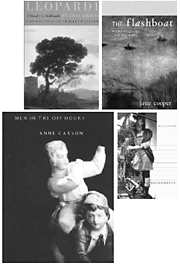SAILING ALONE AROUND THE ROOM NEW AND SELECTED POEMS by Billy Collins (Random House, $13.95)
Billy Collins’ latest collection makes you realize, if you haven’t already, that he’d rather acquire fans than speak to intelligent readers. He presents himself as our witty, observant pal, poking around inside the days we tend to rush through and showing us the cool stuff we overlook. He’s the affable poet, dispelling the Poetic Mystery for us with parodies of Wordsworth and the sonnet—a musical sophisticate who’s still taking piano lessons. A totally harmless fellow, then, buzzed on espresso or beamish on wine, he roams the house in a sweatshirt or bathrobe, bringing the same entertaining smarts to Beethoven and Sartre as he does to R&B and “Three Blind Mice.”
Collins’ imitations of deep thought require no mental effort on our part. He puts us in a good mood, always either amused or pleasantly misty. He lets generic description stand for painstaking observation. His “ideas” never force us to get up and go anywhere: We simply watch them pile up like soft snow. Collins hooks us, in short, because he makes us feel smart without making demands on our minds.
His familiar gimmicks are on ample display in Sailing Alone Around the Room (just released in paperback). In a few of these poems, he appears intent on demanding more from his readers, but in the end, he never does. In “The Iron Bridge,” a meditation on his mother’s death, he’s standing on an actual bridge and pointing to a plaque that dates its construction to 1902, when his mother was a year old. But he quickly deserts the actual with his well-worn mantra, “Imagine—.” The word whisks him to “a mother in her infancy” and, in a move his fans never seem to tire of, he gives the vacuous line a shot of deadpan comedy: “a Canadian infant at that,/one of the great infants of the province of Ontario.” When Collins finds his way back to the bridge again and the water “below” (where else?), the scene blurs into reader-friendly generalities as hackneyed as his empty image of the 1902 bridge builders (“workmen in shirts and caps”). The wind is blowing, although eight lines up, the water is glassy calm, but why expect this poet to notice when he can write that a human child at the age of 1 is “tiny”? For all his pretense about being observant, his language demonstrates otherwise.
The poem, like the poet’s mom, plunges on to better things despite facile sentiment (“wildflowers,” “swans,” “float,” “leafy,” “soft,” “infant,” “wide eyes,” “boundless,” and—twice—”tiny”). Still, the Canadian jokes say: Don’t take any of these feelings too seriously. They also suggest why Collins is our poet laureate despite his shameless, habitual indulgence in words like “little” and “nest,” his pukey “small plants singing/ with lifted faces” (in the otherwise fine “Picnic, Lightning”), his treacly hokum that we become beautiful by being foolish. His poems cradle us in spurious affection, while a Seinfeldian semi-seriousness lets us pretend we’re not really getting soppy.
Lighter poems among the new ones in the book sail around the same old room. In “Dharma” the dog goes out the door sans hat, umbrella, cash, or doghouse keys, proving herself a better model of nonattachment, says Collins, than Gandhi in “his holy diapers.” With this wisecrack, the poet guarantees that the dullest reader will grasp the irony behind his Buddhist teaching: As usual, he’s way too cool to believe his own ideas. The joke also covers for a stale doggy catalog of “brown coat,” “blue collar,” “wet nose,” and “plume” of a tail. Why “plume”? Because Collins’ limp string of ideas, not the animal he claims is self-sufficient, needs fluffing up.
There’s no forward movement until the last stanza, but as the author learned from writing the old “Marginalia” and “Victoria’s Secret”—and proves again with his new “Reading an Anthology of Chinese Poems” (and again with “The Names,” the 9/11 commemoration he read to Congress earlier this month)—if he runs the same concept over and over, he’ll get a longer poem.
The good lines suggest that Collins can write better than this but that he dumbs his work down to make it appealing and safe for his dimmer companions. We’re never struck, even by surprise; we’re only ever nudged—then quickly returned to restful glimpses of landscapes and mental interiors as comfy-cluttered as the poet’s kitchen. His wit implies that we can surrender to his poems without surrendering our intelligence. In truth, we must stop thinking if we are to read him a second time with more than just the memory of having enjoyed him the first time around.
info@seattleweekly.com 








